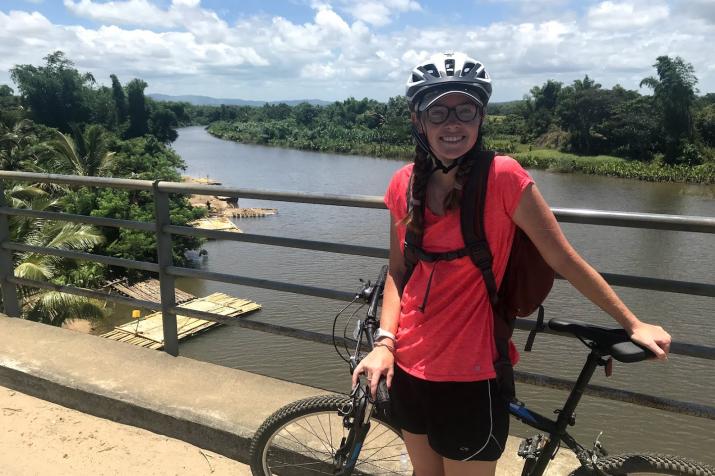
DGHI master's student Hana Zwick in Madagascar, where she served as a Peace Corps volunteer before coming to Duke
Published April 6, 2022 under Education News
When the COVID-19 pandemic abruptly ended Katie Thomas’ Peace Corps experience, she found herself at a loss over what to do. On a plane home from Zambia, where she had been working to improve nutrition and prevent malaria in rural households, she contemplated her next step.
“I wanted to find an avenue to work in health policy,” says Thomas. “I loved the work I was doing in Zambia, from interacting with different NGOs (non-governmental organizations) to understanding funders better. It made me decide to pursue global health and have a policy focus from this side.”
Thomas came across DGHI’s Master of Science in Global Health Program, and once she enrolled in fall 2020, she heard about a pilot option that offered an alternative to field-based research. Instead, students intern for six months with a global health organization identified by DGHI. To complete the program, students submit and defend a masters paper drawn from their internship experience.
Thomas was one of five master’s students who chose the practice-based option in its pilot year. The others are Nathan Ellermeier, Isabeaux Kennedy-Mitton, Shivani Surati and Hana Zwick. All are preparing to graduate this May, with plenty of real-world global health experience to show for it.
“At first when I enrolled, I felt I didn’t have a good understanding of the global health field, and that’s what I wanted to get from the internship,” says Zwick, who also came to Duke after a pandemic-shortened Peace Corps deployment in Madagascar. “I wanted to see the work behind the scenes that allows people to be boots-on-the-ground.”

Katie Thomas, one of the first students...
Zwick interned with John Snow, Inc., a global public health consulting organization. She helped a team analyze and interpret data about infectious diseases on various projects. Her master’s paper focused on a feasibility study related to tuberculosis.
“All of my work focused on infectious diseases,” says Zwick. “I really like mixed-method studies so I spent a lot of time digging into quantitative analysis and statistics, and I really enjoyed that.”
Zwick says she figured out something else important by completing her internship. “I learned I don’t want to get my Ph.D. right away. I want to work in global health first where I have an impact.”
Thomas interned with Maryland-based University Research Corp., which works to improve health outcomes in more than 90 countries. Her work focused on examining HIV/AIDS prevention programs in three African countries – eSwatini, Niger and Uganda – and providing recommendations on best practices and improvements.
Thomas describes the experience as “wonderful” and credits DGHI for giving her the technical writing skills and confidence needed to excel. She also praises her mentor, URC’s Lani Marquez, for her guidance.
“For me, it was such a time of learning, and there were many times I was unsure,” Thomas says. “[Marquez] was very pivotal in some of my experiences. She really facilitated my learning and growth.”
In December, Thomas became the first DGHI student to be named to the Presidential Management Fellows Program, an entry level leadership program directed by the U.S. Personnel Management Office. She hopes to find a career in health policy and program analysis.
Sarah Martin, DGHI’s assistant director for graduate admissions and special projects, notes that the first five pathway students showed resilience by enrolling in its pilot year, which came in the midst of pandemic lockdowns.
“In the first few months of the pandemic, we didn’t know what DGHI classes or the community would look like, but they took a chance to start graduate school and become a part of this inaugural group,” says Martin. “We are so impressed with what they’ve been able to accomplish in difficult circumstances.”
But while the inaugural class wasn’t able to have in-person internship experiences, they still had meaningful experiences, Zwick says.
“The advice and mentoring I received was amazing,” says Zwick. “I’m taking away a better understanding of global health, and the current state of it. If you want broad experiences in global health, I would highly recommend [the practice-based pathway].”


